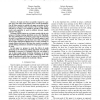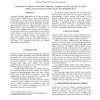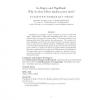609 search results - page 27 / 122 » Adaptive ranking of web pages |
WEBI
2010
Springer
13 years 5 months ago
2010
Springer
Abstract--To make sure they can quickly respond to a specific query, the main search engines have several mechanisms. One of them consists in ranking web pages according to their i...
ICMCS
2007
IEEE
14 years 1 months ago
2007
IEEE
Automatic web page segmentation is the basis to adaptive web browsing on mobile devices. It breaks a large page into smaller blocks, in which contents with coherent semantics are ...
WEBI
2010
Springer
13 years 5 months ago
2010
Springer
Abstract--Search engines have greatly influenced the way people access information on the Internet as such engines provide the preferred entry point to billions of pages on the Web...
WEBDB
1999
Springer
13 years 11 months ago
1999
Springer
Many information resources on the web are relevant primarily to limited geographical communities. For instance, web sites containing information on restaurants, theaters, and apar...
IM
2007
13 years 7 months ago
2007
PageRank is a popularity measure designed by Google to rank Web pages. Experiments confirm that PageRank values obey a power law with the same exponent as In-Degree values. This ...



